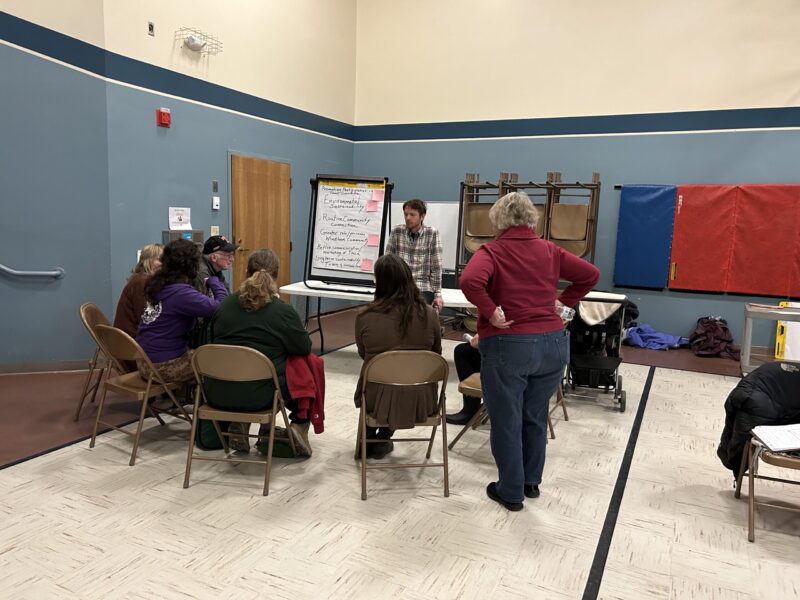
Helping Communities Move Projects Forward: The Community Assessment and Project Prioritization Process (CAPP)
Above: Halifax community members brainstorm during a breakout session during a community meeting on March 25, 2023| Photo: BDCC Staff
Faced with unprecedented funding as part of COVID relief, many small towns in southern Vermont have struggled with deciding how to use these funds.
For example, the Halifax Selectboard followed community engagement best practices when they received their federal COVID relief dollars. They put out a call to the community, and had several special meetings where they solicited ideas from the community. But when a long list of potential projects surfaced, the Select Board was still faced with uncertainty about how to determine what projects would best meet community needs. Had enough people weighed in? Which projects were actually doable within the Town’s capacity to look for additional funding?
In Wardsboro, a similar situation arose after the Town received a Village Center designation from the state in late 2022. As part of their new designation, the community held a meeting to brainstorm potential ideas about how they could leverage the benefits of that new designation. A long list of good ideas surfaced! But again, what were the community priorities? What projects should they begin with, and how could they engage more people in the process?
To help communities work through these questions, Brattleboro Development Credit Corporation’s Southern Vermont Economy Project (SVEP) launched a new program with its third round of funding from the USDA Rural Community Development Initiative.
The Community Assessment and Project Prioritization Process (CAPP) is a local project planning process, designed to help Southern Vermont communities get together around a list of community ideas and recognize the greater community goals that are the driving force behind the ideas. Armed with an understanding of how each potential idea could help the community meet a key goal, towns emerge better able to prioritize projects.
CAPP is more than just a visioning exercise. It picks up where that visioning and brainstorming leaves off. CAPP helps structure further discussion around factors that may be used to prioritize a project, from how well it advances broader community goals such as supporting young families or elder residents. Other factors may include time-sensitive opportunities to secure outside funding, or clear leadership and support from within the community.
Structured, but informal conversations help projects take shape and move forward. As part of the CAPP process, communities draw up a project summary sheet which identifies local project leads as well as any community partnerships that will be needed to move key projects forward. This not only helps municipal and extra-municipal or regional groups establish partnerships, it also expands awareness on the part of municipal officials about important projects that are taking place in their community (but are not necessarily under municipal control).
After a series of community meetings, SVEP staff produce a report that sums up the process. The report captures all the generated ideas (whether they were generated as part of, or prior to the start of the CAPP process), a list of stated community goals, and priority projects that align with those goals. The report provides a project summary for each priority project, and a road map of initial steps towards implementation, including potential funding sources, to help community leaders move forward.
To date, SVEP has worked in three Southern Vermont communities: Wardsboro, Halifax and Windham. While each community came to the CAPP process at different points in their journey, inviting community stakeholders to come together and hold conversations around a brainstormed list of ideas has helped to build shared understanding of the deeper goals that are the driving force behind local projects. With clearly identified leaders and partnerships, and a path forward, the priority projects have started to gain momentum in each CAPP community, and have also more easily invited additional community participation with the built-in community support that the process builds!
For more information, or if you feel like the CAPP process could help your community, please reach out to the SVEP program manager at mstaloff@brattleborodevelopment.com.
About the Southern Vermont Economy Project (SVEP)
The Brattleboro Development Credit Corporation’s Southern Vermont Economy Project provides training and technical assistance to increase local capacity, skills, and resources in order to advance local projects critical to Southern Vermont achieving community, economic, and workforce development goals. SVEP is funded through the USDA Rural Community Development Initiative. For more information please visit https://brattleborodevelopment.com/svep.
About BDCC and SeVEDS
The Brattleboro Development Credit Corporation (BDCC) is a private, nonprofit economic development organization that serves as a catalyst for industrial and commercial growth throughout Southeastern Vermont, including Windham County and the towns of Readsboro, Searsburg, Winhall and Weston. BDCC serves as the State of Vermont’s certified Regional Development Corporation (RDC) for the greater Windham County area. BDCC is one of 12 RDCs throughout Vermont. This BDCC activity was made possible in part by a grant from the State of Vermont through the Agency of Commerce and Community Development. For more information visit https://brattleborodevelopment.com.
Southeastern Vermont Economic Development Strategies (SeVEDS) is an affiliate of BDCC that grew from a 2008 grassroots effort, initiated by BDCC, to understand and create long term strategies needed to reverse the economic decline of the Windham Region and plan for the economic impacts from the closure of the Vermont Yankee nuclear power plant. In 2014, after multiple years of regional input, education and data gathering, SeVEDS received federal approval for the Windham Region’s federally recognized S.M.A.R.T. Comprehensive Economic Development Strategy (CEDS). SeVEDS partnered with Bennington’s Regional Economic Development Group in 2018 to develop the 2019 Southern Vermont Zone CEDS. For more information visit www.seveds.com.



